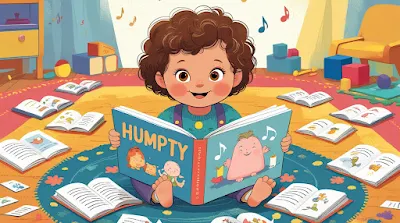When you sing “Twinkle Twinkle Little Star” for the hundredth time, it might feel like just a cute moment, but something incredible is happening in your toddler’s brain. Nursery rhymes aren’t just fun; they are powerful tools for cognitive development.
Let’s explore how these simple songs boost your child’s memory, rhythm, and early learning skills — all through rhyme!
📌 1. Boosting Memory Through Repetition
Nursery rhymes are naturally repetitive — and that’s a good thing!
🔹 Toddlers learn by hearing things over and over.
🔹 Repetition helps strengthen neural connections and builds long-term memory.
🔹 Children begin to anticipate what comes next and eventually say or sing along!
🧠 Fun Fact: Studies show that musical repetition improves auditory memory in young children, helping them remember words, sounds, and even routines.
🎶 2. Enhancing Rhythm and Coordination
From clapping hands to stomping feet, nursery rhymes build a sense of timing and rhythm.
-
Toddlers learn to match movement with beat.
-
Rhythmic patterns train the brain for language and reading.
-
Many rhymes like “If You’re Happy and You Know It” or “The Wheels on the Bus” involve coordinated actions, boosting motor skills too.
🕺 Rhythm is more than music — it’s a foundation for listening, speaking, and even reading fluency.
🗣️ 3. Supporting Language and Listening Skills
When toddlers hear rhymes:
-
They learn new words in context.
-
They recognize sound patterns (cat/hat, sheep/sleep).
-
They practice intonation, pronunciation, and memory recall.
🎤 As they grow, they begin to recite rhymes independently, helping build confidence and communication.
👪 4. Creating Joyful Learning Moments
Nursery rhymes create an emotional connection. Whether you're singing at bedtime, in the car, or during play, you're turning learning into a loving, shared experience.
💬 "My daughter learned to say her first full sentence by singing ‘Row, Row, Row Your Boat’ with me — every night!" – a parent’s story
🌟 How to Make the Most of Nursery Rhymes
✔️ Repeat rhymes daily
✔️ Clap, tap, or dance to the beat
✔️ Pause and let your child fill in words
✔️ Use actions to match lyrics
✔️ Celebrate your child’s attempts — even if they sing off-key!
💖 Final Thoughts
Nursery rhymes are more than just fun sing-alongs — they are powerful learning tools disguised as play. By singing rhymes regularly, you’re helping your toddler grow in memory, rhythm, language, and confidence.
So the next time you sing “Baa Baa Black Sheep”, know this: you’re not just entertaining your child — you’re building their brain.
Check where you can buy nursery rhymes to monetize on YouTube.













0 Comments